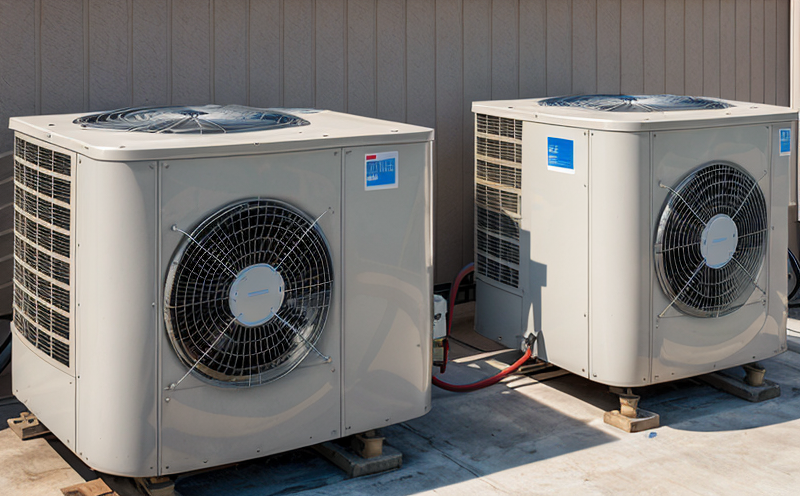ISO 16484-7 Validation of Control System Functions
The ISO 16484 series is a set of standards specifically designed for the HVAC (Heating, Ventilation, and Air Conditioning) sector. It provides comprehensive guidelines to ensure that HVAC systems are reliable, efficient, and safe for use in various environments. Among these standards, ISO 16484-7 focuses on the validation of control system functions within HVAC equipment. This service ensures that all critical control systems meet stringent performance criteria as outlined by international best practices.
The process involves a series of rigorous tests to validate that each component operates flawlessly under specified conditions. This includes checking for proper response times, accuracy, and reliability in various operational scenarios. The testing encompasses both hardware and software aspects of the control system, ensuring they work seamlessly together to achieve optimal performance.
Our laboratory employs state-of-the-art instrumentation to conduct these tests accurately and efficiently. Each test scenario is meticulously planned to simulate real-world conditions that the HVAC equipment might encounter in different applications—be it residential buildings, commercial spaces, or industrial facilities. By doing so, we provide a robust validation process that builds trust among end-users.
One of the key aspects of our ISO 16484-7 Validation service is its ability to identify potential issues early in the development lifecycle. This proactive approach helps manufacturers refine their products before they reach market, reducing costly recalls and improving overall product quality. Furthermore, this validation process enhances the safety and efficiency of HVAC systems, contributing significantly to energy savings and environmental sustainability.
Our team of experts ensures that every aspect of the control system is thoroughly evaluated according to ISO 16484-7 requirements. From initial design reviews to final acceptance testing, we maintain a high level of precision throughout each stage. This comprehensive approach guarantees that the validated control systems not only comply with but exceed industry standards.
The detailed nature of our validation process allows us to provide precise documentation and reports for every aspect tested. These documents serve as valuable tools for quality managers and compliance officers, offering clear insights into the performance capabilities of the HVAC equipment. They also form a crucial part of the procurement process, ensuring that only high-quality products are selected.
By choosing our ISO 16484-7 Validation service, you can ensure that your control systems meet all necessary requirements and exceed expectations in terms of reliability and efficiency. This not only enhances product quality but also strengthens your company's reputation in the HVAC sector.
Why Choose This Test
The ISO 16484-7 Validation service offers numerous advantages for those involved in HVAC equipment manufacturing and quality assurance. Here are some compelling reasons why choosing this test is beneficial:
Enhanced Reliability: By validating control systems according to international standards, you ensure that your products perform consistently across various environments. This reliability translates into better customer satisfaction and trust.
Innovation Support: Our rigorous testing process helps identify areas for improvement early in the development cycle. This supports continuous innovation and refinement of HVAC equipment.
Compliance Assurance: With stringent compliance checks, you can rest assured that your products meet all necessary regulatory requirements. This reduces the risk of non-compliance penalties and enhances market access.
Cost Efficiency: Early identification of issues during validation saves costs associated with late-stage product modifications or recalls.
Market Differentiation: Demonstrating adherence to international standards like ISO 16484-7 sets you apart from competitors, enhancing your brand’s reputation and appeal in the market.
Safety Assurance: Ensuring that control systems operate safely under all conditions is crucial for protecting both users and the environment. This service guarantees the highest standards of safety.
International Acceptance and Recognition
The ISO 16484-7 Validation process enjoys widespread international recognition, making it a preferred choice for HVAC equipment manufacturers worldwide. Its acceptance is driven by the fact that it aligns with global best practices in HVAC system design and functionality.
Many countries have adopted these standards as part of their national regulations to ensure consistent quality across borders. This means that products validated against ISO 16484-7 are more likely to gain acceptance in diverse markets without additional hurdles.
The rigorous nature of the validation process also enhances confidence among stakeholders, including buyers, regulators, and end-users. This reliability fosters a robust market ecosystem where manufacturers can trust that their products will perform reliably across various conditions.
Moreover, participating in such standardized processes helps companies stay ahead in competitive markets by meeting or exceeding global standards. It also facilitates smoother international trade by ensuring compatibility with local requirements without the need for extensive adaptation.
Competitive Advantage and Market Impact
Adopting ISO 16484-7 Validation not only ensures compliance but also provides significant competitive advantages. Here’s how it impacts your business:
Increased Trustworthiness: Compliance with international standards builds trust among customers, investors, and other stakeholders. This can lead to increased market share and customer loyalty.
Better Product Quality: The stringent testing process helps identify and rectify issues early in the development phase, leading to higher quality products that meet or exceed expectations.
Enhanced Efficiency: Validated control systems operate more efficiently, contributing to reduced energy consumption and operational costs. This can translate into significant savings for both manufacturers and end-users.
Innovation Facilitation: By validating products according to the latest international standards, companies stay ahead of industry trends and can introduce cutting-edge solutions faster.
Regulatory Compliance: Adherence to global standards ensures that your products meet all necessary regulatory requirements, simplifying compliance processes and reducing legal risks.
Better Reputation: Demonstrating commitment to high-quality manufacturing practices enhances your brand’s reputation, making it more attractive to potential customers and partners.





